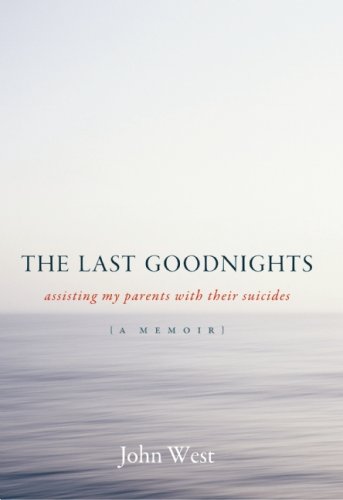As a culture, Americans may not have the most difficulty absorbing death — we don’t have any widows throwing themselves on burning pyres, after all — but we certainly aren’t the most well-adjusted people when it comes to contemplating the end of the end. And although we aren’t the only country to enact laws forbidding assisted suicide — I’m reasonably certain it’s illegal in most countries — we have devoted a substantial amount of public discussion to the subject, and as Jack Kevorkian could tell you, it makes a lot of people awfully uncomfortable.
It’s into this climate that Jack West releases The Last Goodnights: Assisting My Parents With Their Suicides, a memoir of his experiences with the planned deaths of his terminally ill parents. About 10 years ago, in a spectacularly painful convergence of shitty luck, West’s father and mother both discovered they were approaching death — and in a bit of even shittier luck, they both asked West to help them arrange their final exits. It’s an incredible story, but it’s true, and whatever your feelings about helping someone die, The Last Goodnights adds something valuable to the conversation.
West’s father, a prominent psychiatrist and UCLA faculty member who has his own Wikipedia entry and whose death made the obituary papers in the Los Angeles and New York Times, was a larger-than-life figure — he sparred with Scientologists, marched with Martin Luther King, examined Patty Hearst, and was one of the first American doctors to bring attention to the treatment of South African prisoners under apartheid — and from West’s loving-yet-unvarnished description of “Jolly’s” life, it isn’t hard to understand why he’d want to end it on his own terms, especially after being diagnosed with late-stage cancer.
Not long after agreeing to help his father end his own life, West learns that his mother has similar plans; she’s suffering from emphysema, mid-stage Alzheimer’s, and other ailments, and makes it known that she wants to make this decision while she’s still capable of making any at all. And so, over the next 200 pages or so, we travel with the author through his preparations for both of his parents’ deaths — a journey that’s occasionally darkly comic (his mad dash to procure a precscription needed for his father’s death devolves into a screwball caper), often sweetly moving, and especially toward the end, utterly harrowing. Comparatively speaking, West’s father gets the better deal, checking out fairly quickly; it really isn’t until he’s forced to confront his mother’s slow descent into what she calls “non-creature” status that things start to get grim.
Funnily enough, what keeps The Last Goodnights from turning into a complete tearjerker is West’s own deficiencies as a writer — not only is his voice rather stiff, and dotted with too many exclamation points, but he can come across as a bit of a douche, as when he unnecessarily airs his family’s dirty laundry, explaining in painstaking detail all the reasons why his parents couldn’t rely on his sisters to help carry out their final wishes. Still, his intense love for his mother and father is unavoidably clear in these pages, and when he reaches the point where he’s drinking so much that he falls down the stairs in his own home, your heart can’t help but break for him.
It’s obviously meant as more of a memoir than a grand statement or a work of art, but The Last Goodnights has plenty of profound moments — like the conversation between West and his mother in which she states, in an ever-rarer moment of lucidity, “Maybe death is terrible, but I don’t think so.” Whether you’re flatly opposed or firmly in support of assisted suicide, you’ll be forced to ask yourself what you’d do in West’s position, and that really isn’t a bad question for any of us to try and answer.

 John West – The Last Goodnights: Assisting My Parents With Their Suicides (2009, Counterpoint)
John West – The Last Goodnights: Assisting My Parents With Their Suicides (2009, Counterpoint)![Reblog this post [with Zemanta]](http://img.zemanta.com/reblog_e.png?x-id=4c91b99b-7ff6-42b1-b0d7-a1e24a2d3eb0)



Comments